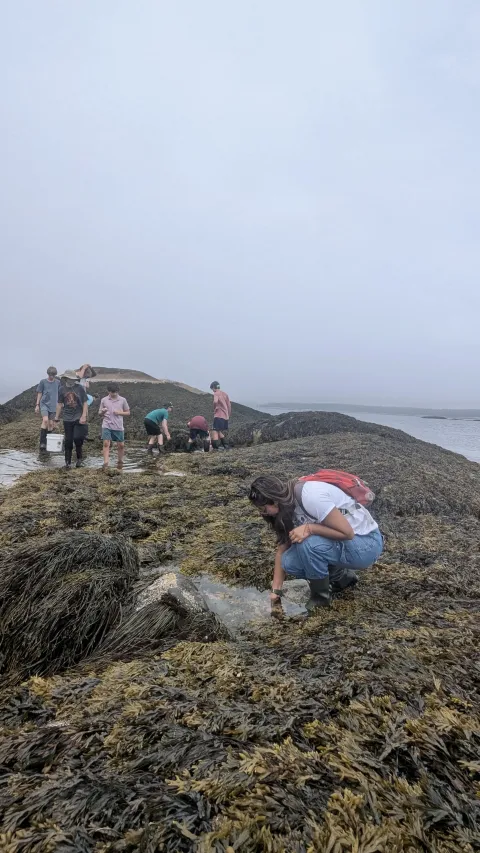Sustainability Fellowship at Hurricane Island Center for Science and Leadership

Madeleine Diaz '26, from Emerson, NJ, is a wildlife and conservation biology major at UNH. This summer, Madeleine was awarded a sustainability fellowship at the Hurricane Island Center for Science and Leadership in Rockland, ME.
Why did you apply for the Sustainability Fellowship?
Madeleine Diaz: I applied for the sustainability fellowship to get an immersive experience that would expose me to new opportunities, skills, and people. While applying for internships, strong community support and environmental education were at the forefront of my search. The sustainability fellowship provided both- a supportive community through the UNH Sustainability Institute and a wonderful opportunity in which I get to broaden my skill set and enjoy a coastal summer in Maine as an educator.
Please describe your sustainability initiative. (Who you are working for, what your responsibilities are.)
Madeleine: This summer, I have the privilege of working with Hurricane Island Center for Science and Leadership as an educator. This role entails leading multiple educational programs throughout the summer, collaborating with fellow staff and educators, designing lesson plans, and participating in a communal living environment on the island.
What are you hoping to accomplish during this experience?
Madeleine: My previous research and internship opportunities have focused on terrestrial ecology, and during this experience I wish to broaden my skills, knowledge, and experiences to include marine systems as well. I aim to develop and present a variety of lesson plans this summer that fit within the island curriculum. I am also hoping to strengthen my public speaking, communication, and engagement skills.
How do you think this experience will impact you?
Madeleine: I think that this experience will allow me to step outside of my comfort zone and fully immerse myself in an ecosystem I have not had the opportunity to explore before. This fellowship allows me to connect with students across the country and integrate their perspectives, ideas, and interests into lessons. It has been a privilege to learn from each and every one of them and each group allows me to challenge myself both as an educator and as a conservation student. Working in this unique environment has introduced me to a supportive community on the island and a plethora of firsts.
Beyond this fellowship, how is UNH preparing you for a career that prioritizes sustainable social and environmental good?
Madeleine: UNH is preparing me for a career that prioritizes sustainable social and environmental good by introducing me to resources and professionals that support me towards achieving my career goals. As a Wildlife and Conservation major interested in the intersection between environmental ecology, conservation, and social justice, UNH has provided me resources and support that has allowed me to branch out to a plethora of unique communities whose ideas, lived experiences, and interests constantly broaden my and diversify my perspective.
What should prospective students know about UNH?
Madeleine: Prospective students should know that there are a multitude of hands-on opportunities available not only through the Sustainability Institute, but also through the professors, advisors, and resources provided throughout your time at UNH. Through UNH, I have been able to complete a variety of internships, research, volunteer hours, studied abroad, and have met amazing professors.
Tell us one unique or interesting thing about yourself.
Madeleine: I have assisted with research on soil invertebrates (NZ), bats (WA), and moose (NH).
Learn more
SHARE